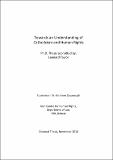| dc.description.abstract | The paradoxical arrival of a Christian and Catholic rights based tradition in the early 20th century problemitises histories of international law and human rights. An historical presentation of the emergence of international law tends to move progressively from Grotius and the Enlightenment period of natural rights, toward the 19th century’s classical formulations of international law. From there an account of the development of international law moves from the League of Nations to the construction of the United Nations after World War II and the process of building institutions and international mechanisms, agreeing treaties and establishing Courts to settle disputes, unfolds. The advancement of an era for international law and politics, initiated an alignment of global institutions, which included the participation of the human rights project, bringing rights ideas into in its normative assumptions.
Nevertheless, this account creates its own boundaries, setting some normative values at the centre and others to the periphery. One striking question that drives this thesis is how religion moved, and continues to move, across and through that standard narrative, from the centre to the periphery. It is because Catholicism played such a formative role in the construction of Western legal culture that it became the focal point of this enquiry. The account of international law from its origin in the treaties of Westphalia, and located in the writing of the Grotian tradition, had lost contact with another historical tradition of international law that reappeared with the growth of the early 20th century human rights movement.
This thesis seeks to relocate and reunite that history of law and political theory that has shadowed this dominant narrative. Western legal culture had looked to the Christian religion for its foundational ideas, and at the beginnings of the human rights movement returned to that moral vocabulary to ground the further growth of international order in the 20th century. In recognising this technique of periodically returning to religion by Western legal culture, this thesis endeavours to provide a more complete account of understanding the human rights project that factors in the contribution that Catholicism made to a general theory of sovereignty, international law and human rights. | en_IE |


